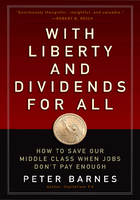
PREFACE
I wrote this book because I'm appalled by the decline of America's middle class and outraged when our leaders mislead us about what we can and can't do to stop it.
That said, I'm not by nature an angry person, and this isn't an angry book. I'm a practical person who has started and led businesses for most of my working life. I want to fix capitalism rather than scuttle it. I therefore take a seasoned and, I hope, reasoned look at how our economy presently distributes income and how it might do so better in the future, without in any way diminishing liberty.
We must face the fact that jobs alone won't sustain a large middle class in the future—there just aren't, and won't be, enough good-paying jobs to do that. This means we need broadly shared streams of nonlabor income. The best way to create those streams isn't with taxes; rather, it's with dividends from wealth we own together. Such dividends make political as well as economic sense. They rest on conservative as well as liberal principles and can unite our country rather than divide it.
Dividends of this sort aren't redistribution; they're a way to allocate income fairly in the first place so that there's less need to redistribute later. Nor are they government transfers or private charity. Rather, they're legitimate property income.
Dividends from co-owned wealth won't only halt the decline of our middle class; they'll have ancillary benefits as well. They'll dampen capitalism's overuse of nature and, at the same time, supply enough debt-free purchasing power to keep our economy humming.
Of course, I'm fully aware that just because an idea makes sense doesn't mean it will be adopted. Powerful industries and individuals will fight dividends from co-owned wealth. On top of that, our political system is so dysfunctional right now that it can barely keep our government open, much less fix our economy's deeper flaws. Still, I advance this simple and sensible idea because, while system changes don't happen often, they do happen occasionally. A crisis comes, and suddenly what was once unthinkable becomes not only plausible but necessary. Think back to the 1930s and 1940s if you want reminders.
That doesn't mean we should passively wait for a crisis to hit. Quite the contrary: the crisis of 2008 was wasted because we didn't prepare for it beforehand. System change requires work that begins well before the reigning system falters. The time to lay the groundwork for universal dividends, therefore, is now. This book shows why and how.